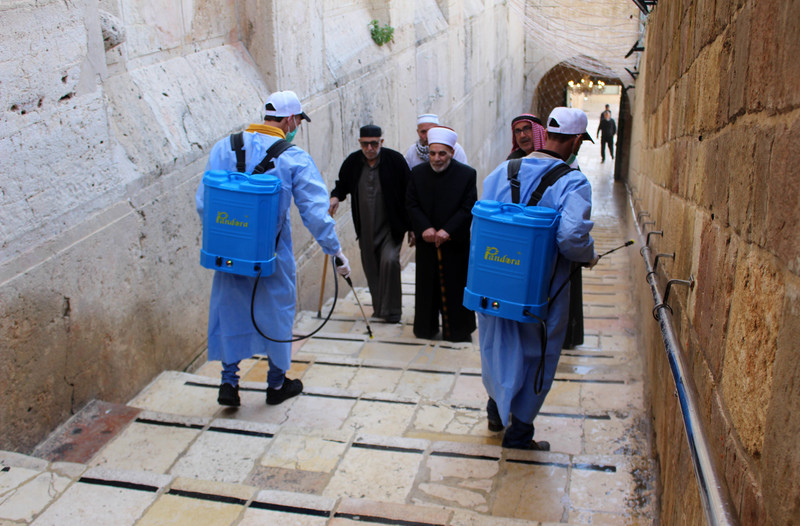Australia/Israel Review
Deconstruction Zone: Who is helping the Palestinians battle coronavirus?
Mar 31, 2020 | Khaled Abu Toameh

While Israel is working overtime with Palestinians to curb and prevent the spread of the coronavirus, the Arab states appear to be doing what they do best when it comes to helping their Palestinian brothers: nothing at all.
In early March, Israeli authorities delivered hundreds of coronavirus testing kits to the Palestinian Authority in the West Bank. Israeli and Palestinian professional teams have been working together to prevent the spread of the virus.
The Israeli authorities have also delivered another 200 coronavirus testing kits to the Hamas-ruled Gaza Strip, despite the thousands of rockets and incendiary and bomb-carrying balloons that the ruling government, Hamas, has launched from there towards Israel.
In addition, Israeli authorities have coordinated the transfer of 20 tons of disinfectant material from Israeli factories to the Palestinian health sector.
It is worth noting that Egypt, which has a shared border with the Gaza Strip, did not send any test kits or disinfectant materials to the Palestinians living there.
Palestinians in Lebanon, meanwhile, are worried that the Lebanese authorities may use the coronavirus as an excuse to intensify restrictions even further on their refugee camps.
Samir Geagea, a Lebanese politician and chairman of the Lebanese Forces, an anti-Palestinian Christian political party, has come under sharp criticism for calling for the immediate closure of the 12 Palestinian refugee camps in his country.
As of January 2019, there were 475,075 Palestinian refugees in Lebanon, according to the United Nations Relief and Works Agency for Palestine Refugees (UNRWA).
“Palestinians in Lebanon do not enjoy several important rights,” UNRWA pointed out.
“They cannot work in as many as 39 professions and cannot own property [real estate]. Because they are not formally citizens of another state, Palestinian refugees are unable to claim the same rights as other foreigners living and working in Lebanon.”
Palestinian refugees are barred from numerous professions in Lebanon, including medicine, law and engineering.
“After more than seventy years, Lebanon remains the country where Palestinian refugees suffer the most, where they are deprived of many of their economic and human rights, including working in certain professions, procedural complications in obtaining work permits, and denial of the right to own property,” said Dr. Mohsen Saleh, Director-General of the Zaitouna Centre for Studies in Beirut.
Palestinians are now worried that, in addition to the discriminatory and apartheid measures, Lebanese authorities may confine them to their refugee camps on the pretext of fighting coronavirus.
Tayseer Khaled, a senior member of the PLO’s Democratic Front for the Liberation of Palestine (DFLP), denounced Geagea’s proposal as “racist and unacceptable.” The idea of imposing a lockdown on the refugee camps, he said, “is in violation of human rights and human values.”
Another PLO faction, the Popular Front for the Liberation of Palestine (PFLP), said in response to Geagea’s proposal that “racist minds, and not refugee camps, need to be placed in isolation.”
As Palestinians were expressing concern over Lebanon’s discriminatory and apartheid laws, Assad Abu Khalil, a Lebanese-American professor at California State University, Stanislaus, came out with another blood libel against Israel – the only country that is helping the Palestinians in the war on the coronavirus. On March 8, the professor tweeted: “Israel will – I am sure – have different medical procedures for Jews and non-Jews. Non-Jews will be put in mass prisons.”
The Lebanese professor, who claims to be “pro-Palestinian,” does not seem concerned about the severe restrictions imposed on Palestinians by his own country – Lebanon. Nor does he seem bothered that a Lebanese (and not Israeli) official is the one who is actually calling for placing Palestinians in “mass prisons.”
It would be imprudent for the Palestinians to harbour any illusions that Lebanon, Egypt or most of the Arab countries would come to their aid, particularly in light of the outbreak of the coronavirus.
Lebanon has been discriminating against the Palestinians for decades.
Egypt, for its part, long ago abandoned the Palestinians by essentially sealing its border with the Gaza Strip. The Lebanese, Egyptians and most Arabs perceive the Palestinians as Israel’s problem.
When the current virus crisis has passed, it is to be hoped that the Palestinians will remember that one country alone came to their rescue: Israel.
Khaled Abu Toameh, an award-winning Palestinian Affairs journalist based in Jerusalem, is a Shillman Journalism Fellow at the Gatestone Institute, where this article was originally published. © Khaled Abu Toameh, reprinted by permission, all rights reserved.
Tags: Israel, Lebanon, Palestinians, coronavirus






